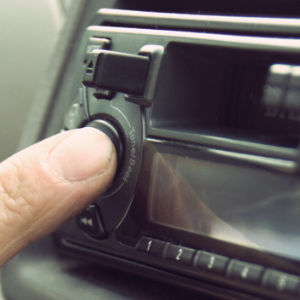
Lawmakers and broadcast station operators continue to mount pressure on manufacturers of electric vehicles who are deliberately leaving out AM radio tuners in their new, all-electric cars.
On Monday, WRDN (1430 AM) station owner Brian Winnekins was interviewed on the cable news channel NewsNation to express concern that the trend among automakers could gain momentum in a way that would make continued operation of an AM radio station unviable.
During the interview, Winnekins noted that WRDN, which serves the Eau Claire market, still tuned in for things like farm reports, high school sports, local government affairs and other information that regional AM stations are expected to provide.
“We’re concerned for our consumers,” Winnekins said. “We don’t want them to lose their ability for free, over-the-air local radio.”
For radio station owners like Winnekins, the matter is not difficult: Around 75 percent of motorists listen to AM or FM radio in their cars, according to a survey conducted by Edison Research last year. Removing AM radio not only cuts into the potential reach of their stations (which has obvious business implications for broadcasters who use AM radio frequencies), it also opens the door for carmakers to find a reason for eventually ditching the FM tuner, too.
Electric vehicle manufacturers say the issue is more complicated than broadcasters would like to admit: Motors used by electric vehicles generate interference, they say, and that interference creates annoying static on the AM radio band.
Cars made by Tesla were some of the first to help propel mass interest in electric vehicles — both by motorists and lawmakers, some of whom have mandated a move away from fuel vehicles within the next two decades. In 2018, the Wall Street Journal noted that Tesla vehicles used an electric motor that created interference with the AM radio band. Tesla eventually stopped installing AM radio tuners in their cars completely.
General Motors, which makes the Chevy Bolt, also had a problem with electric motors causing AM radio interference. The Journal said GM took steps to address the problem, but the carmaker didn’t specify what it did to solve it, if anything at all.
Manufacturers say they’re meeting driver demands for free radio by offering a mixture of FM, HD Radio, satellite radio and streaming solutions. Winnekins and other broadcasters say the interference problem could easily be solved if carmakers used shielding and took other steps to ensure that motors didn’t cause problems for people tuned in to AM radio.
“If that motor is causing interference to AM, it’s actually causing interference to AM radios in other vehicles,” Winnekins asserted during his NewsNation interview on Monday, though there have been no known reports of motorists blaming other electric vehicles for interference in their cars.
On Monday, the New York Times said some Tesla customers that the newspaper interviewed claimed they weren’t bothered by the lack of AM radio in electric vehicles. But a report released by Edison Research in 2021 showed nearly 80 percent of Americans surveyed felt it was important for AM and FM radio tuners to be standard equipment in cars, and that the majority of prospective car buyers would be less likely to buy or lease a new vehicle if it didn’t have a traditional radio tuner in it. (The survey was sponsored by the National Association of Broadcasters and Xperi, the company that licenses HD Radio technology.)
Support for AM radio has also come from Congress, with U.S. Senator Ed Markey recently sending a letter to top automakers urging them to find ways to continue supporting terrestrial radio in their vehicles.
In his letter, Markey said AM radio remains a critical lifeline during emergencies when other technology, including Internet-based applications and mobile phones, fail.
“As a result, any phase-out of broadcast AM radio could pose a significant communication problem during emergencies,” Markey wrote. “Although the auto industry’s investments in electric vehicles are critical to addressing the climate crisis and reducing greenhouse gas emissions, automakers need not sacrifice the benefits of radio in the process.”
Markey requested the automakers — 20 of them received the letter — submit written responses by December 22 indicating the vehicle models that will lose broadcast radio support, the technology automakers are using to continue supporting AM and FM radio despite interference from electric vehicles, and whether companies offer ways for motorists to access free, digital broadcast radio in their cars. It was not clear if any of the automakers have responded to Markey’s request for information.









So, if I operate a ham radio transmitter that causes interference to my neighbor’s TV, I can just have the gov’t remove their TV.
Sweet!!!
When major operators abandon AM radio, what do you expect from listeners and auto makers? Expecting auto makers to put your radio band on their car radio when you don’t care about it and listeners aren’t interested is on you, and that’s as simple as it gets. The day is coming when AM and FM won’t be on new car radios. If you want to be listened to, you’ll have to be streaming. It’s what buyers want.
No it’s not. Unless it’s free, I’m not paying another internet provider. In fact I really don’t want my vehicle even connected to the internet. I am retired IT, and I don’t live in China. I will not buy a vehicle that cannot have the internet disabled. There are a lot of us out there!
Maybe Congress could put some pressure on the FCC to enforce Part 15 of the rules? That would clean up a lot of the electronic garbage that trashes AM reception and, in some cases, even FM. Interference from car engines is nothing new. Remember ignition noise and alternator whine? It can be cleaned up with appropriate filters. Likewise the interference from the motors in electric cars.
Correct!